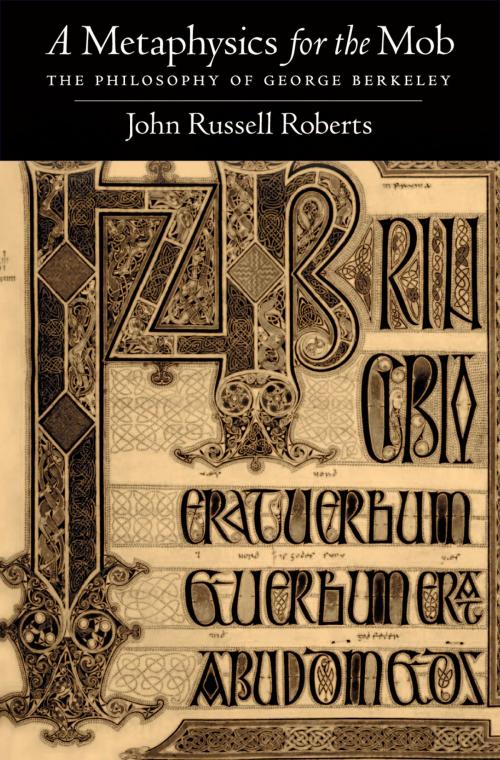A Metaphysics for the Mob
The Philosophy of George Berkeley
Nonfiction, Religion & Spirituality, Philosophy, Modern, Metaphysics| Author: | John Russell Roberts | ISBN: | 9780190295363 |
| Publisher: | Oxford University Press | Publication: | May 18, 2007 |
| Imprint: | Oxford University Press | Language: | English |
| Author: | John Russell Roberts |
| ISBN: | 9780190295363 |
| Publisher: | Oxford University Press |
| Publication: | May 18, 2007 |
| Imprint: | Oxford University Press |
| Language: | English |
George Berkeley notoriously claimed that his immaterialist metaphysics was not only consistent with common sense but that it was also integral to its defense. Roberts argues that understanding the basic connection between Berkeley's philosophy and common sense requires that we develop a better understanding of the four principle components of Berkeley's positive metaphysics: The nature of being, the divine language thesis, the active/passive distinction, and the nature of spirits. Roberts begins by focusing on Berkeley's view of the nature of being. He elucidates Berkeley's view on Locke and the Cartesians and by examining Berkeley's views about related concepts such as unity and simplicity. From there he moves on to Berkeley's philosophy of language arguing that scrutiny of the famous "Introduction" to the Principles of Human Knowledge reveals that Berkeley identified the ideational theory of meaning and understanding as the root cause of some of the worst of man's intellectual errors, not "abstract ideas." Abstract ideas are, rather, the most debilitating symptom of this underlying ailment. In place of the ideational theory, Berkeley defends a rudimentary "use theory" of meaning. This understanding of Berkeley's approach to semantics is then applied to the divine language thesis and is shown to have important consequences for Berkeley's pragmatic approach to the ontology of natural objects and for his approach to our knowledge of, and relation to other minds, including God's. Turning next to Berkeley's much aligned account of spirits, the author defends the coherence of Berkeley's view of spirits by way of providing an interpretation of the active/passive distinction as marking a normative distinction and by focusing on the role that divine language plays in letting Berkeley identify the soul with the will. With these four principles of Berkeley's philosophy in hand, he then returns to the topic of common sense and offers a defense of Berkeley's philosophy as built upon and expressive of the deepest metaphysical commitments of mainstream Christianity. Roberts' reappraisal of this important figure should appeal to all historians of philosophy as well as scholars in metaphysics and philosophy of language.
George Berkeley notoriously claimed that his immaterialist metaphysics was not only consistent with common sense but that it was also integral to its defense. Roberts argues that understanding the basic connection between Berkeley's philosophy and common sense requires that we develop a better understanding of the four principle components of Berkeley's positive metaphysics: The nature of being, the divine language thesis, the active/passive distinction, and the nature of spirits. Roberts begins by focusing on Berkeley's view of the nature of being. He elucidates Berkeley's view on Locke and the Cartesians and by examining Berkeley's views about related concepts such as unity and simplicity. From there he moves on to Berkeley's philosophy of language arguing that scrutiny of the famous "Introduction" to the Principles of Human Knowledge reveals that Berkeley identified the ideational theory of meaning and understanding as the root cause of some of the worst of man's intellectual errors, not "abstract ideas." Abstract ideas are, rather, the most debilitating symptom of this underlying ailment. In place of the ideational theory, Berkeley defends a rudimentary "use theory" of meaning. This understanding of Berkeley's approach to semantics is then applied to the divine language thesis and is shown to have important consequences for Berkeley's pragmatic approach to the ontology of natural objects and for his approach to our knowledge of, and relation to other minds, including God's. Turning next to Berkeley's much aligned account of spirits, the author defends the coherence of Berkeley's view of spirits by way of providing an interpretation of the active/passive distinction as marking a normative distinction and by focusing on the role that divine language plays in letting Berkeley identify the soul with the will. With these four principles of Berkeley's philosophy in hand, he then returns to the topic of common sense and offers a defense of Berkeley's philosophy as built upon and expressive of the deepest metaphysical commitments of mainstream Christianity. Roberts' reappraisal of this important figure should appeal to all historians of philosophy as well as scholars in metaphysics and philosophy of language.















